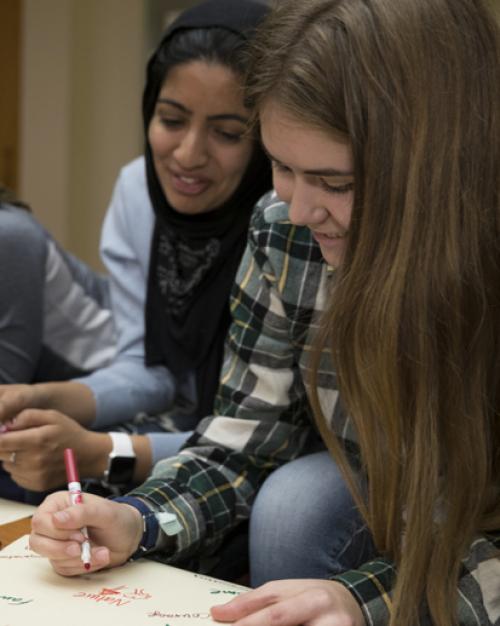Expanding their efforts to support first-generation, low-income students, the College of Arts & Sciences will offer three new programs, starting this summer — a Summer Scholars Institute and small group advising seminars for first-year students, and a guaranteed summer internship program for sophomores.
The college is also increasing the number of spots available to Arts & Sciences first-years in Cornell’s Pre-freshmen Summer Program (PSP), starting this summer.
“Our goal is to provide tailored academic and career mentoring to first-generation students that introduces them to the culture of higher education, supports their well-being, and unlocks growth opportunities they might not otherwise know how to access,” said Bonnie Comella, assistant dean and director of advising for the College of Arts & Sciences.
Since its founding, Cornell has been an institution dedicated to granting access to first generation students and students with limited financial means through needs-based scholarships and numerous other service.
Last year, Cornell offered more than $239 million in grants, with the average Cornell grant award for a first-year student in the Class of 2021 being $40,686, and as high as $76,997.
About 1 in 8 students in the College of Arts & Sciences is a first generation student. As the first in their families to attend college, these students understandably lack some guidance and high school experiences that make the transition to the rigor of Cornell’s curriculum more difficult than for other students, she said.
The new Summer Scholars Institute supports 20 students, who will visit campus for a one-week residential experience, said Paul Sulzer, the advising dean who designed and directs the program.
Program participants will sharpen their reading and writing skills at workshops conducted by the John S. Knight Institute and take part in activities related to career development, health and wellness, public service and financial literacy, Sulzer said.
Participants will also reflect on their first-generation identity and the challenges and opportunities that come with being the first in their family to attend college. They’ll also meet faculty, staff and students who will support their Cornell journey, as well as be introduced to Cornell’s history and traditions and take part in field trips to local state parks and Ithaca’s summer events.
“The Summer Scholars Institute allows participants additional time to digest the scene they will be in when they return for New Student Orientation in August,” Sulzer said. “Students will also get to develop close connections with other first gens.”
First generation students will also benefit from a new guaranteed internship program, the Pathways Internship Program, which will connect them to positions in the summer after their sophomore year.
Starting next fall, eight sophomores selected for the program will work with senior career associate Ana Adinolfi, who will guide them through the process of finding an internship. They will meet with career counselors monthly and complete a series of assignments, such as resume reviews and mock interviews. They’ll also be mentored as they research potential employers and undertake the application process, Adinolfi said.
“We’re evening out the access of first generation students with their peers who might have networking opportunities, or a different level of understanding about what goes into an internship search process.” Adinolfi said. “Junior year, they’ll be able to take the ball and run with it and they will also already have had a significant career experience.”
The students will also receive grants of up to $8,000 to offset expenses from these summer experiences, which are often unpaid.
A third resource for students will be weekly small group advising seminars, which started this year as a pilot project and were incredibly successful, Comella said.
In the fall semester of 2017, six groups of 10 students each met with their faculty advisor once a week, discussing issues such as time management, the value of the liberal arts curriculum opportunities and navigating Cornell and all of its resources. Those meetings continued this spring for the 30 first-year spring admission students in the college.
The weekly meetings and intimate advising experience help first-year students transition to Cornell, said Gretchen Ritter, Harold Tanner Dean of Arts & Sciences.
This fall, the pilot will be expanded to include close to 500 students paired with 50 faculty members, with the goal of ultimately including all first-year students in the college, Comella said.
The response from faculty interested in participating in the pilot has been outstanding, she said. They are eager to have meaningful interactions with their first year advisees, and provide added support to first-generation students who will especially benefit from faculty mentoring.
Increasing the number of A&S students in the PSP program will be another opportunity for first-generation, low-income students. PSP is a six-week summer program designed to help students prepare for the challenges of their freshman year. They generally enroll in regular summer-session courses; enrichment courses in areas such as writing, chemistry, or mathematics; and/or a college-achievement seminar.
“Many of us in the college – faculty, staff, alumni, and students – are first generation ourselves and we understand what it takes to adjust to and persist at Cornell,” Comella said. “Providing the support and resources students need to reach their academic and career goals, and knowing that they aren’t going through it alone, is key to their success.”
This story also appeared in the Cornell Chronicle.




